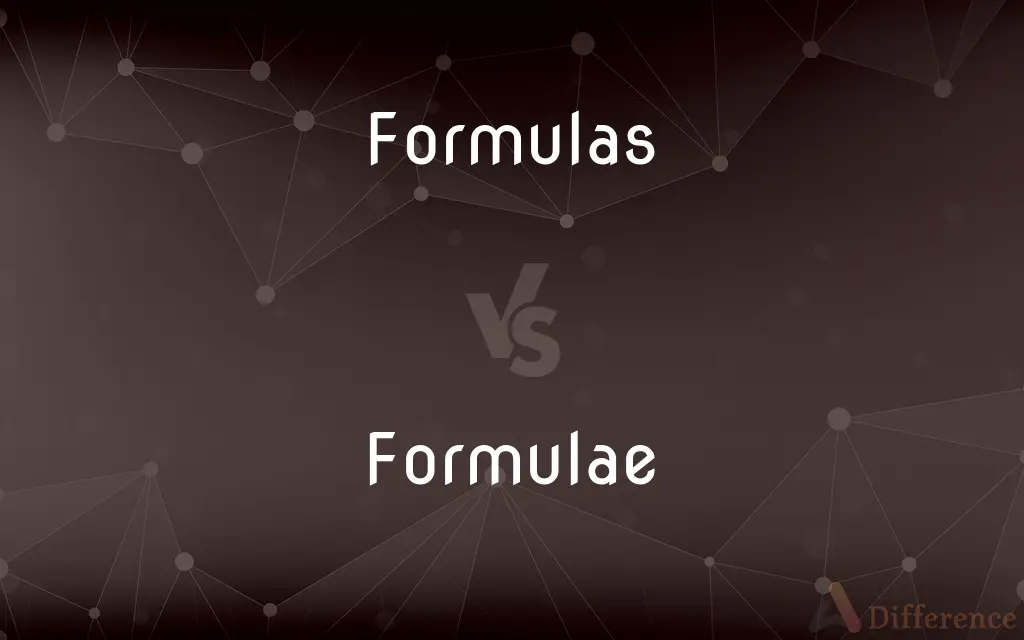Formulas vs. Formulae — What's the Difference?
By Tayyaba Rehman — Updated on October 3, 2023
"Formulas" and "Formulae" both denote the plural of "Formula," but "Formulas" is preferred in American English, while "Formulae" is traditionally used in British English.

Difference Between Formulas and Formulae
Table of Contents
ADVERTISEMENT
Key Differences
While both "Formulas" and "Formulae" indeed serve as the plural form of "Formula," distinct usage patterns emerge between American and British English. "Formulas" tends to be widely accepted and utilized within American English contexts, embracing a more modern linguistic tilt. Conversely, "Formulae" finds its roots deeply embedded within British English, maintaining a classical and somewhat academic resonance.
"Formulas" can be observed pervading scientific, mathematical, and general contexts within American English, embodying a versatile and universally accepted form. In contrast, while "Formulae" also percolates through various subjects within British English, it often conjures an antiquated or formal aura, making it less prevalent in casual dialogue or writing.
Examining linguistic evolution and adaptability, "Formulas" emerges as a testament to linguistic simplification and modernization in American English. On the other side of the spectrum, "Formulae" steadfastly upholds the traditional Latin pluralization, showcasing British English’s penchant for maintaining classic linguistic forms.
Diving into academic and scientific realms, "Formulas" readily presents itself in American textbooks, research papers, and discussions, harmonizing with the nation’s linguistic norms. Meanwhile, "Formulae" might weave through British scholarly materials and dialogues, exhibiting a nuanced preference for traditional language, especially in formal or scholarly scenarios.
Thus, while "Formulas" and "Formulae" are interchangeable in the essence they convey, the discerning difference lies entrenched in regional linguistic preferences, with the former aligning with American English and the latter, while understood globally, resonating more profoundly with British English speakers and classical language enthusiasts.
ADVERTISEMENT
Comparison Chart
Regional Preference
Predominantly American English
Leans towards British English
Formality Level
Acceptable in both formal & informal
Sometimes considered more formal/classical
Linguistic Trend
Modern, simplified
Traditional, classic
Academic Usage
Common in American scholarly materials
Observed in British academic contexts
General Usage
Universally understood
Universally understood, but less common
Compare with Definitions
Formulas
Plural form of “formula,” often used in American English.
The scientist devised several formulas during his research.
Formulae
Common in academic and scientific literature.
Numerous formulae were assessed during the experiment.
Formulas
Can represent multiple mathematical expressions.
The teacher explained the formulas for algebraic calculations.
Formulae
May be chosen for a slightly formal or traditional tone.
She was fascinated by the various formulae in classical physics.
Formulas
Applied in various disciplines like science, mathematics, and finance.
The accountant demonstrated financial formulas.
Formulae
Sometimes utilized to denote plural methods or procedures.
The textbook highlighted formulae for solving equations.
Formulas
Sometimes utilized in general language to denote multiple methods or recipes.
The chef created unique formulas for sauces.
Formulae
Traditional plural form of “formula,” often found in British English.
The professor discussed complex formulae in the lecture.
Formulas
May denote various prescribed or standardized methods.
She learned various formulas to solve the problems.
Formulae
An established form of words or symbols for use in a ceremony or procedure.
Formulas
An established form of words or symbols for use in a ceremony or procedure.
Formulae
An utterance of conventional notions or beliefs; a hackneyed expression.
Formulas
An utterance of conventional notions or beliefs; a hackneyed expression.
Formulae
A method of doing or treating something that relies on an established, uncontroversial model or approach
A new situation comedy that simply uses an old formula.
Formulas
A method of doing or treating something that relies on an established, uncontroversial model or approach
A new situation comedy that simply uses an old formula.
Formulae
A symbolic representation of the composition or of the composition and structure of a compound.
Formulas
A symbolic representation of the composition or of the composition and structure of a compound.
Formulae
The compound so represented.
Formulas
The compound so represented.
Formulae
A prescription of ingredients in fixed proportion; a recipe.
Formulas
A prescription of ingredients in fixed proportion; a recipe.
Formulae
A liquid food for infants, containing most of the nutrients in human milk.
Formulas
A liquid food for infants, containing most of the nutrients in human milk.
Formulae
(Mathematics) A statement, especially an equation, of a fact, rule, principle, or other logical relation.
Formulas
(Mathematics) A statement, especially an equation, of a fact, rule, principle, or other logical relation.
Formulae
Formula(Sports) A set of specifications, including engine displacement, fuel capacity, and weight, that determine a class of racing car.
Formulas
Formula(Sports) A set of specifications, including engine displacement, fuel capacity, and weight, that determine a class of racing car.
Formulae
Typically used in formal and classical contexts.
The research paper elucidated various chemical formulae.
Formulas
Inflection of formula
Common Curiosities
Are "Formulas" and "Formulae" interchangeable?
Yes, but "Formulas" is American English, and "Formulae" is traditionally British English.
Can "Formulas" be used in formal writing?
Yes, it's acceptable in both formal and informal contexts in American English.
Is "Formulae" considered outdated?
Not necessarily, but it is seen as more classical and formal.
Can "Formulas" be used in scientific writing?
Absolutely, it's common in various disciplines in American English.
Which is preferable for academic usage?
"Formulas" in American English and "Formulae" often in British English contexts.
Which term is used more frequently worldwide?
"Formulas" is likely encountered more due to the global influence of American English.
Is it incorrect to use "Formulae" in American English?
No, it's understood but less common than "Formulas."
Is "Formulae" a Latin pluralization?
Yes, "Formulae" adheres to traditional Latin plural forms.
Can "Formulas" and "Formulae" be used in mathematics?
Yes, both terms are applicable in mathematical contexts.
Which term is used in the scientific community?
Both, but “Formulas” might be seen more frequently in international contexts.
Can both terms be found in English dictionaries?
Yes, both "Formulas" and "Formulae" are recognized and defined.
Is one term more formal than the other?
"Formulae" might be perceived as slightly more formal or classical.
Are there contexts where one term is preferred over the other?
"Formulas" is typically preferred in modern contexts, while "Formulae" might be chosen for a traditional tone.
Can I use "Formulas" in British English writing?
Yes, but "Formulae" might be expected in formal or academic writing.
Which term should be used in international communication?
"Formulas" may be more universally understood and is often recommended.
Share Your Discovery

Previous Comparison
Dago vs. Guinea
Next Comparison
Telegram vs. TelegraphAuthor Spotlight
Written by
Tayyaba RehmanTayyaba Rehman is a distinguished writer, currently serving as a primary contributor to askdifference.com. As a researcher in semantics and etymology, Tayyaba's passion for the complexity of languages and their distinctions has found a perfect home on the platform. Tayyaba delves into the intricacies of language, distinguishing between commonly confused words and phrases, thereby providing clarity for readers worldwide.















































